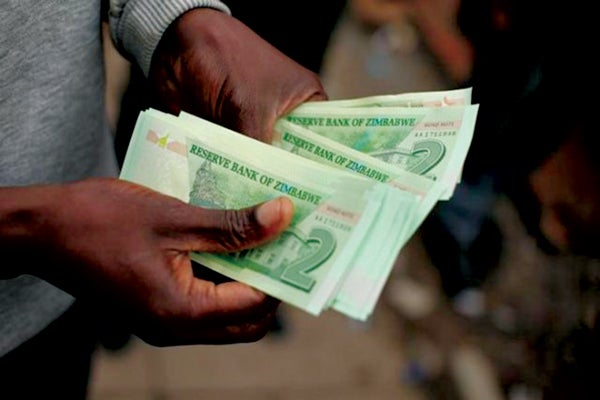Source: Zim economy seen shrinking by 10% – The Zimbabwe Independent November 1, 2019

The bond notes were introduced last year to help ease cash shortages.
Kudzai Kuwaza
ZIMBABWE’S gross domestic product (GDP) is seen contracting by as much as 10% by the end of the 2019 financial year owing to bad weather and power shortages as the economic crisis besetting the economy worsens.
Well-placed sources this week said Zimbabwe’s debt rescheduling plan — initially expected in March next year — is not succeeding in the manner envisaged by Finance minister Mthuli Ncube.
In off-the-record briefings with officials from various international financial institutions (IFIs) this week, businessdigest established that the country’s GDP decline is going to be greater than projected, and is seen at just over 10% on the back of the deteriorating economic situation in the country and falling production.
The International Monetary Fund (IMF) projects the economy will contract by 7,2% by the end of the year, while government sees the economy shrinking by up to 6%.
This comes as the Staff-Monitored Programme (SMP) between the IMF and government, which is supposed to run until March next year, hangs in the balance. This is due to government’s profligate spending, particularly its payments to Sakunda Holdings, which has thrown the programme into disarray.
The economic crisis is characterised by a debilitating liquidity crunch, an acute foreign currency shortage, low capacity utilisation of less than 30%, prolonged power cuts of up to 18 hours and runaway year-on-year inflation which has breached the 300% mark.
The SMP is an informal arrangement between government and the IMF to monitor the implementation of key economic programmes.
The SMP, sources said, will have to recalibrate as a result of government’s failure to achieve the set targets.
However, of concern to them is the deteriorating relationship between Western countries and Zimbabwe which escalated last week after government’s anti-sanctions march to call for the removal of restrictions imposed on the country in 2001 over human rights violations.
Government has said the restrictions are the main cause for the country’s steep economic decline. However, Western countries say corruption, mismanagement and the failure to institute far-reaching economic and political reforms in government has brought the country to its knees and impoverished the once thriving economy.
“The deteriorating relationship has resulted in the hardening of positions by Western capitals, including Washington, London and Tokyo,” an IFI official said. “This makes debt rescheduling by March next year as declared by Ncube highly unlikely.”
Representatives of the various IFIs have also dismissed the Finance minister’s growth projections in his 2020 pre-budget strategy paper which one official has described as a “fantasy”.
Ncube has projected that the economy will rebound to register GDP growth of 4,6% and has also projected that agriculture will recover from the current -16,3% to 10,3% growth.
“Tobacco receipts are down, gold deliveries are down and even sectors like tourism are not performing well. Where will the growth come from?” an official from one of the IFIs pondered.
A schedule of deliveries shows the total amount of gold delivered to Fidelity Printers — the sole authorised buyer of the mineral — nosedived from 2 323 kilogrammes in May 2019 to just 1 658kg in June.
Three-digit inflation has severely eroded incomes, resulting in a two-month strike by medical doctors that continues wreaking havoc in the public health sector. The doctors are demanding to be paid salaries calculated at the inter-bank forex rate, but government has rejected this demand.
This has been worsened by a recent notice by civil servants that they will not be able to report for duty due to incapacitation. The government workers are demanding payment of salaries at the inter-bank market rate. Civil servants are demanding the equivalent of US$475 as the minimum.
A decree outlawing the use of foreign currency in local transactions on June 24 this year and made the Zimbabwean dollar the sole legal tender, has exerted upward inflationary pressures on the local currency.
The more the local currency depreciated against the US dollar, the more the prices in local terms rise, eroding the buying power of salaried workers.
The Monetary Policy Committee, appointed recently by Ncube, this week announced measures to curb inflation which include limiting the exchange rate pass-through effect to inflation by stabilising the exchange rate and boosting confidence in the local currency.
The measures announced by the committee, however, fall short on detail as to how exactly this will be implemented.
COMMENTS
ZANU PF will be able to pride itself as the Government that ensured that Zimbabwe becomes the poorest country on the planet. Hip hip hoooray…
…and clearly much of the gold production was siphoned off into other channels where producers could get real $s.
ZANUPF gold traders buy gold in RTGS money and sell it on to middlemen in USD – why are we surprised gold sales to the crooked RBOZ are falling comrades